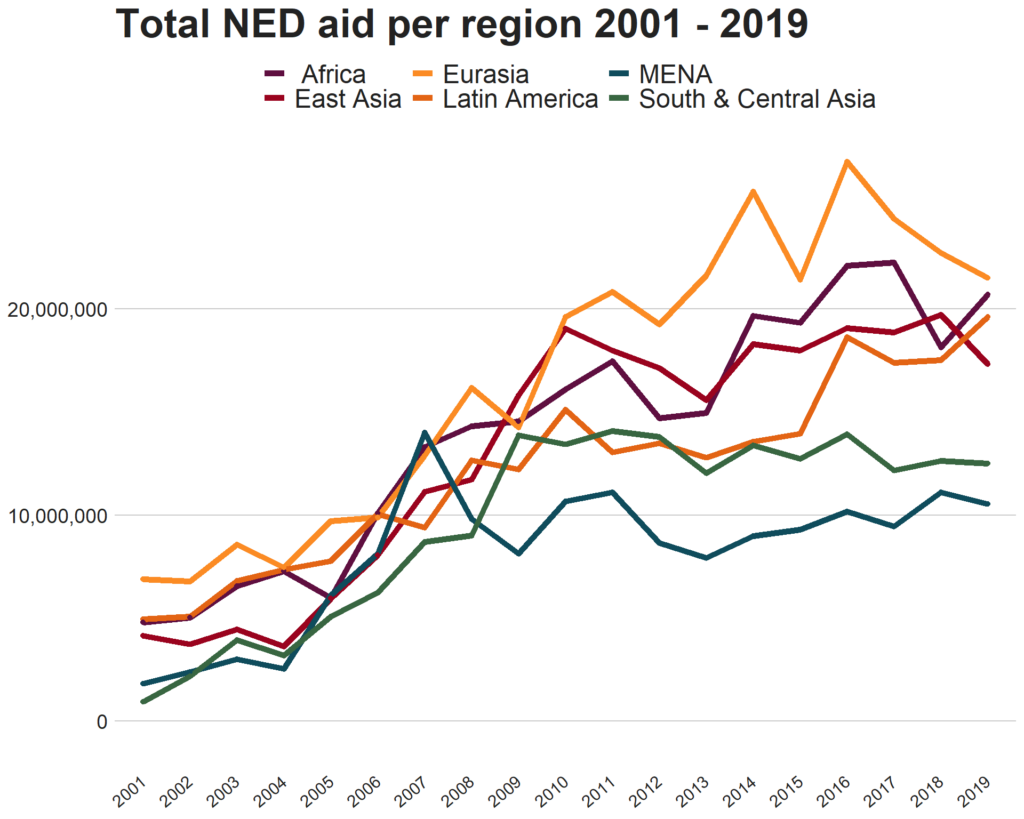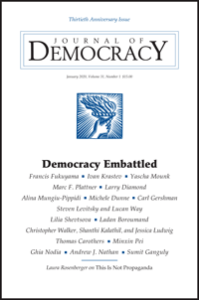
Credit: USAID
In the face of authoritarian resurgence, does U.S. democracy assistance serve as a model for enduring competition?
If democracy assistance is supposed to enhance democratic practice, it should not be aggregated with programs designed to improve health, education, the environment, or economic growth, according to a new USAID report.
Carefully tailored democracy assistance packages can positively affect democratization independent of factors that influence the decision to provide aid, research suggests. Targeted democracy aid appears to provide “more bang for the buck” than other forms of assistance, states the report, Civil society engagement and democracy across different regions:
- The theory behind this influx of aid in recent years is that a vibrant civil society can hold governments accountable and promote democratic norms, the report adds:
- International organizations …. may impact democratization and consolidation by supporting domestic forces and creating incentives for reform in, or to gain membership in, an organization.
- Additionally, some scholars argue that transnational networks may promote democratic reforms in authoritarian societies … “transnational activist networks diffuse democratic principles, support domestic allies, and exert pressure on authoritarian regimes.”
 As it confronts resurgent autocratic rivals, the United States must develop innovative strategic thought, refocus institutions, and refine tactical tools that allow it to execute enduring competition – defined as the judicious use of a nation’s power to defend democracy and influence allies and partners to counter adversaries, argues analyst John Kendall. Democracy assistance through groups like the National Endowment for Democracy (NED) serves as a model for enduring competition, he writes.
As it confronts resurgent autocratic rivals, the United States must develop innovative strategic thought, refocus institutions, and refine tactical tools that allow it to execute enduring competition – defined as the judicious use of a nation’s power to defend democracy and influence allies and partners to counter adversaries, argues analyst John Kendall. Democracy assistance through groups like the National Endowment for Democracy (NED) serves as a model for enduring competition, he writes.
“Democracy promotion assistance strengthens governments, institutions, and democratic participation by providing electoral and municipal support, judicial reform, and law enforcement reform, and by highlighting the importance of human rights and the rule of law,” adds Kendall. “Enduring competition does not seek regime change but instead the moderate and indirect defense of democracy, civil society, human rights, and mutual interests.”
Australia, like other smaller powers, has long been a beneficiary of the liberal-democratic, free-market order shaped by US dominance. That order, however, has been noticeably fraying, notes Lesley Seebeck, an honorary professor at the Australian National University and an independent consultant on strategy, technology and policy. By 2017, the foreign policy white paper recognized direct challenges to international rules, particularly by authoritarian models, while a 2020 defense strategic update identified a commensurate increase in ‘grey-zone’ activities, typically enabled by digital technologies, that skirt accepted behaviors.
The rules-based order has become a clash of norms, she writes for ASPI’s Strategist. While AUKUS has a technology focus, investment in ideas, education, research, and social and community ties—evident in other Western democracies and institutions—will have broader value in supporting liberal democracy and prosperity.
A positive impact on democratization is often considered to be equivalent to an increase in democracy ‘scores’. But the discussion above underscores the flaws in this approach: democratization should be understood to involve several stages, the USAID report continues:
- ‘Democratic transition’ would be measured by a shift in scores from ‘authoritarian’ to ‘democratic’, whereas ‘democratic survival’ implies a ‘holding’ of scores, i.e. no change or at least no decline in scores below the democratic range.
- Democratic transition in turn might be preceded by authoritarian breakdown and political liberalization, during which democracy scores show improvement but remain in the authoritarian range.
- ‘Democratic consolidation’, meanwhile, should manifest itself in democracy scores being maintained for multiple years.
- ‘Deepening’ implies both this maintenance of scores and improvement in separate measures of substantive democracy. Theories of democratization also point to the fact that processes may be slow-moving; thus, noticeable changes from year to year may be unlikely. RTWT

Credit: USAID







